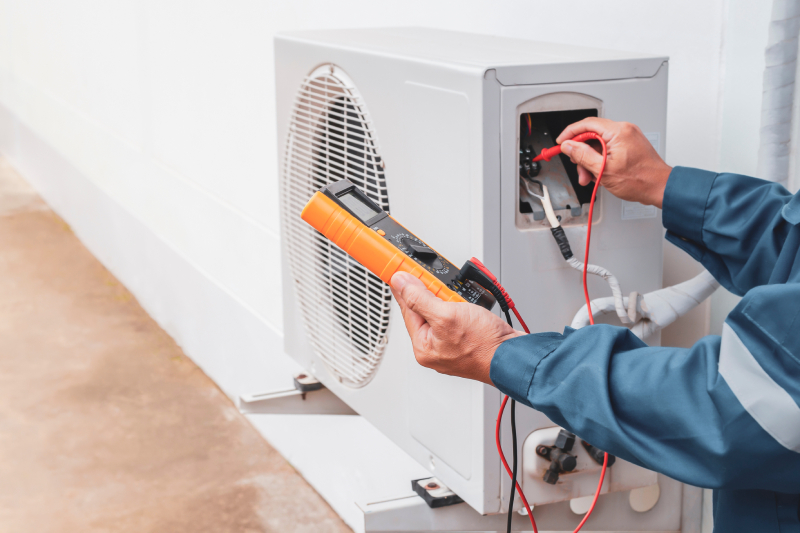Table of Contents
- The Basics of HVAC Maintenance
- Common Misconceptions About HVAC Maintenance
- Cost Benefits of Regular HVAC Maintenance
- The Importance of Air Quality in Your Home
- Steps in a Standard HVAC Maintenance Check-Up
- DIY Tips for Basic HVAC Maintenance
- The Impact of Technological Advancements in HVAC Systems
- Choosing the Right HVAC Professional
The Basics of HVAC Maintenance
Heating, Ventilation, and Air Conditioning (HVAC) systems are essential for preserving indoor comfort and guaranteeing air quality. Functioning quietly in the background, they regulate temperature and humidity to create a pleasant living space, irrespective of external weather conditions. The primary components of an HVAC system—namely, the furnace for warmth in colder months, the air conditioner for cooling during the summer, and the network of ducts that distribute air throughout the home—maintain consistent comfort.
Despite their pivotal role, the optimal functioning of these systems hinges on regular maintenance. Homeowners needing expert services may consider Air Pros Utah: Expert Ductless Mini Split Installation & HVAC Services in SLC Valley to maintain and enhance the performance of their HVAC systems, ensuring they operate at peak efficiency. Conducting routine inspections can help detect minor problems before they develop into expensive repairs. Regularly changing filters, performing system tune-ups, and scheduling professional cleanings are essential for prolonging the lifespan of your HVAC system. A properly maintained system reduces energy costs and promotes a healthier indoor atmosphere. Relying on skilled technicians guarantees that all components operate efficiently, offering reassurance throughout the year.
Common Misconceptions About HVAC Maintenance
Many homeowners misunderstand that once an HVAC system is installed, it functions efficiently without needing ongoing attention or care. This belief could not be further from the truth. Like any other mechanical system, neglecting a regular maintenance routine can lead to undesirable and costly problems. Over time, common problems can develop due to dust accumulation, slight wear on components, and undetected issues. If left unaddressed, these may result in major failures.
Misunderstanding the importance of regular HVAC maintenance can cause homeowners to view this essential task as unnecessary rather than the cost-saving measure it truly is. Regular maintenance helps identify potential problems early and resolve them, thereby avoiding significant repair costs in the future.
Cost Benefits of Regular HVAC Maintenance
Regular maintenance of HVAC systems is comparable to routine vehicle servicing. The initial investment is insignificant compared to the costs of emergency repairs or premature replacement of the entire system. Routine maintenance prevents costly breakdowns and ensures the system operates efficiently, conserving energy and reducing monthly utility bills. The U.S. Department of Energy highlights that a well- maintained air conditioning system can reduce energy consumption by about 15%, resulting in significant savings on electricity bills over time.
Consistent care prolongs the lifespan of an HVAC system, delaying the substantial cost of a replacement unit. By preventing minor issues from developing into larger problems, regular maintenance efforts ensure that the system delivers a comfortable indoor climate for many more seasons to come.
The Importance of Air Quality in Your Home
The air conditioning within your residence significantly influences the health and wellness of all its occupants. Many people are unaware that indoor air quality can be more polluted than outdoor air, especially in homes with poor ventilation or outdated systems. HVAC systems help ensure clean indoor air by removing dust, allergens, and other pollutants that are detrimental to health. However, to work effectively, these systems require regular upkeep to ensure that filters are cleaned or replaced on schedule. In the absence of adequate maintenance, pollutants can accumulate and spread throughout living areas, leading to a decline in air quality and potentially affecting the health of residents.
Pollutants and allergens pose significant risks to respiratory health, including asthma, chronic obstructive pulmonary disease (COPD), and acute allergic responses. Even small amounts of dust, mold spores, or pet dander can trigger severe reactions, making it essential to control indoor air quality. A well-maintained HVAC system can drastically reduce these irritants, offering broader health benefits such as improved sleep, better respiratory function, and enhanced comfort. Beyond those with existing health concerns, everyone in the home benefits from cleaner, fresher air, reinforcing the value of a properly functioning system.
Ultimately, clean air is not merely a luxury but a crucial component of a healthy living environment. Investing time and attention into HVAC maintenance extends the equipments life and fosters a safer, more comfortable home for all occupants. Simple actions, such as replacing filters regularly, scheduling professional inspections, and keeping vents clear, can make a significant difference.
Homeowners can create a healthier space supporting physical well-being and everyday comfort by prioritizing indoor air quality through consistent HVAC care.
Steps in a Standard HVAC Maintenance Check-Up
A comprehensive HVAC maintenance inspection includes several essential tasks a qualified technician should perform. The routine usually starts with assessing and replacing air filters, which is vital for improving air quality and ensuring system efficiency. Clogged or dirty filters can compel the system to operate more intensively, resulting in higher energy usage and possible damage. Furthermore, technicians meticulously check the system for any apparent leaks, especially around ductwork joints, to ensure that conditioned air is not escaping and creating inefficiencies.
An essential aspect of a maintenance inspection includes cleaning the evaporator and condenser coils. Over time, these coils can accumulate dust and debris, significantly reducing the systems efficiency — by as much as 30% if left
unattended. Technicians thoroughly clean these components to restore their optimal functionality. They also check and recalibrate thermostat settings to ensure accurate temperature readings, which helps the system operate efficiently. Proper thermostat calibration is essential for maintaining comfortable indoor temperatures while minimizing energy waste. Although homeowners may manage minor maintenance tasks, such as changing filters or removing visible debris from outdoor units, a professional technician provides a significantly higher level of service. Their specialized knowledge enables them to detect fundamental issues that may develop into significant problems if left unresolved. Through thorough examinations and accurate modifications, experts ensure that the HVAC system functions optimally and enjoys a prolonged lifespan, ultimately providing cost savings for homeowners
and maintaining comfort year-round.
DIY Tips for Basic HVAC Maintenance
Although some aspects of HVAC maintenance necessitate professional intervention, homeowners can undertake numerous simple tasks to ensure their systems operate efficiently. A crucial practice involves routinely inspecting and replacing air filters every one to two months. Obstructed or unclean filters can significantly hinder airflow, leading the system to work harder and consume more energy. Leaves, dirt, and other debris can accumulate around the unit, restricting airflow and potentially causing system malfunctions. Regularly inspecting the area and clearing
any buildup ensures the unit performs at its best. This simple step, often overlooked, plays a significant role in prolonging the life of the HVAC system and preventing minor issues from escalating into costly repairs. Despite these manageable tasks, homeowners should limit themselves to what they can accomplish independently. Complex problems and routine tune-ups are best handled by trained professionals who can adequately diagnose and address
underlying issues. Regular professional maintenance helps prevent major breakdowns and ensures the system operates safely and at peak performance. By combining basic DIY care with expert service, homeowners can maximize the lifespan and efficiency of their HVAC systems.
The Impact of Technological Advancements in HVAC Systems
Recent technological advancements have transformed HVAC systems, making them more efficient, user-friendly, and beneficial. Innovations like smart thermostats have given users more control over their home environment, allowing for precise temperature management from virtually anywhere using mobile devices. This degree of control enhances comfort and significantly contributes to energy savings by optimizing system usage. The Environmental Protection Agency highlights innovations ensuring safer and more enjoyable indoor environments. Embracing these technological features improves the quality of home experiences and offers an opportunity to reduce energy costs.
Choosing the Right HVAC Professional
Finding a dependable and seasoned HVAC professional is crucial in ensuring that maintenance efforts are comprehensive and practical. When selecting a service provider, its best for you to look into their credentials, experience, and customer reviews, which provide insight into their reliability and expertise. Transparent
conversations with potential hires regarding their maintenance approaches and the specific services they offer can make sure that you meet your needs.
Engaging with reputable professionals ensures that your system is in competent hands and provides valuable insights into maintaining your HVAC system. This empowers you as a homeowner to make informed decisions that maximize your systems efficiency and lifespan.

